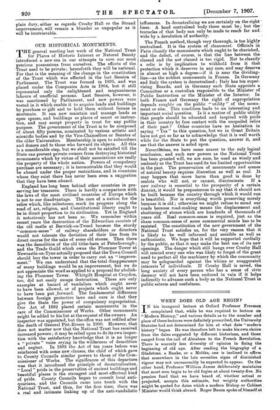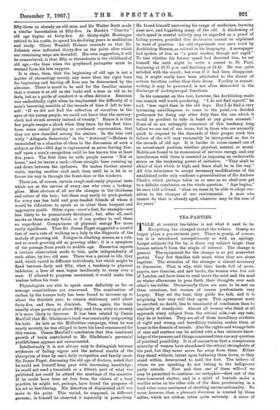WHEN DOES OLD AGE BEGIN?
IN his inaugural lecture at Oxford Professor Freeman complained that, while he was required to lecture on "Modern History," and various details as to the number and place of these lectures were definitely prescribed, the University Statutes had not determined for him at what date " modern history" began. He was therefore left to make his own choi6e from the dates suggested by different historians, and these ranged from the call of Abraham to the French Revolution. There is scarcely less diversity of opinion in fixing the beginning of old age. After reading the biography of 'a Gladstone, a Ranke, or a Moltke, one is inclined to affirm that somewhere in the late seventies signs of diminished vigour may not unreasonably be expected to appear. On the . other hand, Professor William James deliberately maintains that most men begin to be old fogies at about twenty-five. NO pension fund that we have heard of, whether actual or projected, accepts this estimate, but weighty authorities' might be quoted for dates which a modern Bishop or Cabinet . Minister would think absurd. Roger Bacon spoke of himself at
fifty-three as already an old man, and Sir Walter Scott made a similar lamentation at fifty-five. In Dante's " Convito " old age begins at forty-five. At thirty-eight Montaigne retired to his castle, to spend his declining years in meditation and study. Oliver Wendell Holmes reminds us that Dr. Johnson once indicated thirty-five as the point after which our remaining steps are downhill. His own suggestion, it will be remembered, is that fifty or thereabouts is the childhood of old age,—the time when the greybeard youngster must be weaned from his late suppers.
It is clear, then, that the beginning of old age is not a matter of chronology merely, any more than the right time for beginning and leaving off fires can be determined by the alinanac. There is much to be said for the familiar maxim that a woman is as old as she looks and a man as old as he feels, but as a guide of conduct it is often delusive. Emerson was undoubtedly right when he emphasised the difficulty of a man's becoming sensible of the inroads of time if left to him- self : "If we did not find the reflection of ourselves in the eyes of the young people, we could not know that the century- clock had struck seventy instead of twenty." Hence it is that few people escape a shock when they learn for the first time, from some casual greeting or overheard conversation, that they are now classified among the seniors. In the wise and witty " Allegoria Senecttitis" in the " Autocrat"—Holmes is unmatched as a stimulus of ideas in the discussion of such a subject as this—Old Age is represented as never forcing him- self .upon a man's recognition until he has known him at least five years. The first time he calls people answer " Not at home," and he leaves a card,—three straight lines running up and down between the eyebrows. He makes further annual visits, • leaving another card ,each time, until he is let in or forces his way in through the front-door or the windows.
There are, of course, certain-rough-and-ready physical tests which are at the service of every one who owns a looking- glass. Most obvious of all are the changes in the,:thickness aid colour of the hair; but these may easily be pooh-poohed, for every one has bald and grey-headed friends of whom it would be ridiculous to speak as in other than buoyant and aggressive youth. Other signs—crow's-feet, for example—are less likely to be prematurely developed ; but, after all, such marks as these are only facial, or if one prefers to call them so, superficial. Comparisons of physical energy tre more really significant. Thus Sir James Paget suggested a careful test of one's rate of walking as a help to the diagnosis of the malady of growing old. Fatigue in climbing means, as a rule, not so much growing old as growing older ; it is a symptom
of. the passage from. youth to middle age. Hamerton reports
curious urious observation made to him, quite independently of each other, by two old men. There was a period in life, they said, which varied in different individuals, but which might be fixed between forty and fifty, when a tendency to 'physical indolence, a love of ease, began insidiously to creep over a man. If allowed to progress unresisted, it would make him useless before his time.
Physiologists are able to speak more definitely as far as average constitutions are concerned. The combustion of carbon by the human body his been found to increase up to about the thirtieth year, to remain stationary until about forty-five, and then to diminish. Then, again, the brain usually stops growing at about fifty, and from sixty to seventy it is more likely to decrease. It has been related by Canon MacColl that Mr. Gladstone's head was constantly outgrowing his bats. As late as the Midlothian campaign, when be was nearly seventy, he was obliged to have his head remeasured for this reason. Canon MacColl's conclusion that this continual grnwth of' brain contributed to Mr. GladStone's perennial youthfulness appears not unwarranted. .
Intellectually it is not always easy to distinguish between evidences of failing vigour • and the natural results of the absorption of time by one's daily occupation:and family cares.
Sir James Paget, discussing the old age of doctors, noted that he could not himself keep. pace with increasing knowledge ;
he'tould not read a twentieth or a' fiftieth part of what was
phblishefl, nor could he attend the meetings of the societies. If he .could have been set free from the claims of a busy practice, he might not perhipi, have found 'the progress of his art sobewildering:. His detection of diminished skill was more to the point. This varied, he supposed, in different persons ; in himself be observed it especially in prescribing.
He found himself narrowing his range of medicines, learning none new, and forgetting many of the old. A slackening of . one's speed in mental activity may be regarded as a proof of failing powers, provided this declension cannot be explained by want of practice. An odd experiment was once tried by Archbishop Benson, as related in his biography. A newspaper had spoken of him as "a great worker, though not rapid." To test whether his former speed had deserted him, he set himself the next night to write a sonnet to St. Paul„ beginning at 10.15 p.m. and finishing at 11.45. He was quite satisfied with the result ; but even if it had been disappoint- ing, it might easily have been attributed to the disuse of certain faculties rather than their decay. Facility in sonnet- writing, it may be presumed, is not often demanded in the discharge of archiepiscopal functions.
In his comment on this test, however, the Archbishop made one remark well worth pondering. " I do not find myself," he . said, " less rapid than in the old days. But I do find a very increasing unwillingness to come to the point,—a decided preference for doing any other duty than the one which it would be prudent to take in hand at any given moment." Some of us are unhappily conscious of this tendency long before we are out of our teens, but in those who are normally quick to respond to the demands of their proper work this failure of the will may reasonably be interpreted as due to the inroads of old age. It is harder to rouse oneself out of . an accustomed position, whether physical, mental, or moral. Habits are found to be economical of nervous energy, and any • interference with them is resented as imposing an undesirable strain on the weakening power of initiative. " They shall be afraid of that which is high, and fears shall be in the way." All this reluctance to accept necessary modifications of the established order only confirms a generalisation of Sir Andrew Clark's, which perhaps takes us as near as we shall ever get to a definite conclusion on the whole question. " Age begins," he once told a friend, " when we cease to be able to adapt our- selves to the changes of our environment. A man who cannot do that is already aged, whatever may be the sum of his years."











































































 Previous page
Previous page